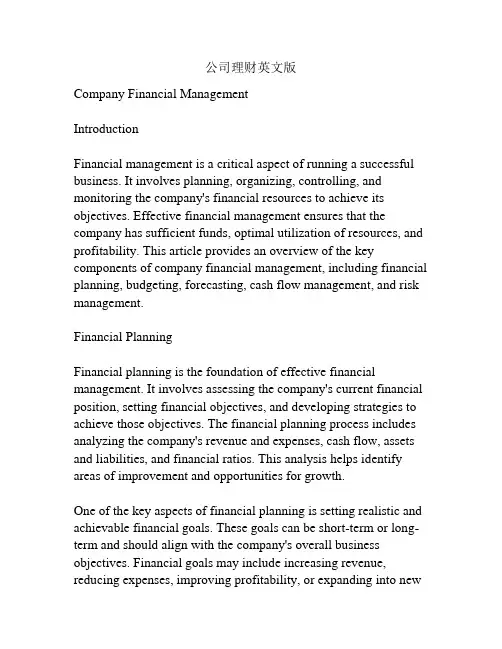公司理财英文版课件(1)
- 格式:pdf
- 大小:2.06 MB
- 文档页数:20






公司理财英文版Company Financial ManagementIntroductionFinancial management is a critical aspect of running a successful business. It involves planning, organizing, controlling, and monitoring the company's financial resources to achieve its objectives. Effective financial management ensures that the company has sufficient funds, optimal utilization of resources, and profitability. This article provides an overview of the key components of company financial management, including financial planning, budgeting, forecasting, cash flow management, and risk management.Financial PlanningFinancial planning is the foundation of effective financial management. It involves assessing the company's current financial position, setting financial objectives, and developing strategies to achieve those objectives. The financial planning process includes analyzing the company's revenue and expenses, cash flow, assets and liabilities, and financial ratios. This analysis helps identify areas of improvement and opportunities for growth.One of the key aspects of financial planning is setting realistic and achievable financial goals. These goals can be short-term or long-term and should align with the company's overall business objectives. Financial goals may include increasing revenue, reducing expenses, improving profitability, or expanding into newmarkets. Setting specific, measurable, attainable, relevant, and time-bound (SMART) goals enhances the effectiveness of financial planning.BudgetingBudgeting is an integral part of financial management as it helps allocate financial resources effectively. A budget is a comprehensive plan that outlines the company's expected revenue and expenses for a specific period, typically a year. It serves as a roadmap for financial decision-making and helps control spending, ensure profitability, and allocate resources efficiently.The budgeting process involves gathering relevant financial data, estimating revenue and expenses, and projecting cash flows. The budget should be realistic, achievable, and aligned with the company's financial goals. It should also be flexible enough to adapt to changing circumstances and market conditions. Regular monitoring and review of the budget help identify variances and take corrective actions if necessary.ForecastingForecasting is an essential component of financial management as it helps anticipate future financial trends and outcomes. It involves analyzing historical data, market trends, and economic indicators to predict the company's financial performance. Forecasting enables companies to make informed decisions, identify potential risks and opportunities, and develop strategies to mitigate risks and exploit opportunities.Cash Flow ManagementCash flow management is crucial for the financial stability and success of a company. It involves monitoring and controlling the company's cash inflows and outflows to ensure sufficient liquidity and meet financial obligations. Effective cash flow management minimizes the risk of cash shortages, improves financial flexibility, and enhances the company's ability to invest in growth opportunities.To manage cash flow effectively, companies need to accurately forecast cash inflows from sales, investments, and financing activities. They also need to monitor and control cash outflows, including payments to suppliers, employee salaries, and loan repayments. Efficient working capital management, such as optimizing inventory levels and extending payment terms with suppliers, can help improve cash flow.Risk ManagementRisk management is an integral part of company financial management. It involves identifying, assessing, and mitigating financial risks that may impact the company's financial stability and performance. Some common financial risks include market risks, credit risks, liquidity risks, and operational risks.To manage financial risks effectively, companies need to develop robust risk management strategies and processes. This includes diversifying investments, hedging against currency or interest ratefluctuations, implementing internal controls and governance structures, and having effective insurance coverage. Regular monitoring and review of risk management strategies help ensure their effectiveness and relevance in the changing business environment.ConclusionEffective financial management is crucial for the success of any company. It involves planning, budgeting, forecasting, cash flow management, and risk management. Financial planning helps set realistic and achievable financial goals, while budgeting allocates financial resources effectively. Forecasting helps anticipate future financial trends and outcomes, and cash flow management ensures sufficient liquidity. Lastly, risk management mitigates financial risks that may impact the company's financial stability and performance. By implementing sound financial management practices, companies can improve profitability, maximize shareholder value, and achieve long-term sustainability.。





公司理财英文版Company Financial ManagementFinancial management is an essential aspect of running a successful company. It involves planning, organizing, controlling, and monitoring financial resources to achieve the company's goals and objectives.The first step in financial management is creating a budget. A budget is a detailed plan that outlines the company's projected income and expenses for a specific period. It helps in allocating resources effectively and identifying areas where expenses can be reduced.To ensure effective financial management, companies need to have a system for tracking and recording financial transactions. This includes maintaining accurate and up-to-date financial statements, such as income statements, balance sheets, and cash flow statements.Another important aspect of financial management is financial analysis. This involves evaluating the company's financial performance, identifying areas of strength and weakness, and making strategic decisions based on the analysis.One of the key objectives of financial management is maximizing profitability. This can be achieved by implementing cost-cutting measures, increasing sales revenue, and optimizing financial resources.Companies also need to manage their cash flow effectively. This includes monitoring cash inflows and outflows, ensuring there is enough cash to cover expenses and investments, and managing short-term liquidity.In addition, companies need to consider long-term financial planning. This involves setting financial goals and developing strategies to achieve them, such as investment planning and capital structure management.Risk management is another important aspect of financial management. Companies need to identify and analyze potential risks, such as financial market volatility, credit risk, and operational risks, and implement strategies to mitigate them. Ultimately, effective financial management is crucial for the success and sustainability of a company. It helps in making informed decisions, maximizing profitability, and ensuring financial stability.。